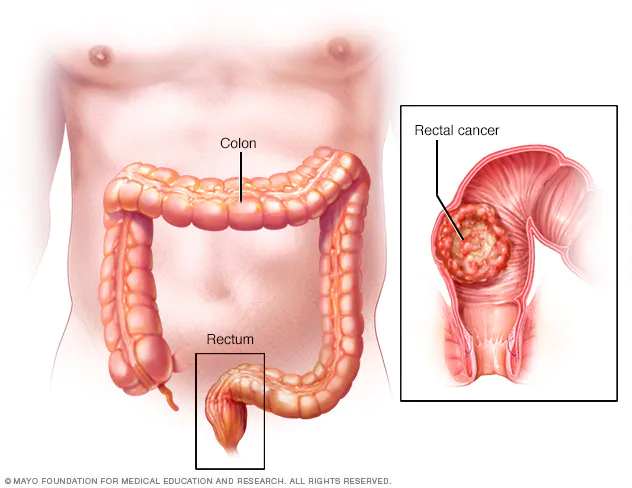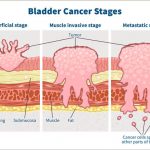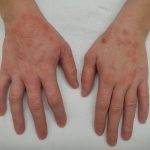Rectal cancer is cancer that begins in the rectum. The rectum is the last several inches of the large intestine. It starts at the end of the final segment of your colon and ends when it reaches the short, narrow passage leading to the anus.
Cancer inside the rectum (rectal cancer) and cancer inside the colon (colon cancer) are often referred to together as “colorectal cancer.”
While rectal and colon cancers are similar in many ways, their treatments are quite different. This is mainly because the rectum sits in a tight space, barely separated from other organs and structures. The tight space can make surgery to remove rectal cancer complex.
In the past, long-term survival was uncommon for people with rectal cancer, even after extensive treatment. Thanks to treatment advances over the last few decades, rectal cancer survival rates have greatly improved.
Symptoms
Signs and symptoms of rectal cancer include:
- A change in bowel habits, such as diarrhea, constipation or more-frequent bowel movements
- Dark maroon or bright red blood in stool
- Narrow stool
- A feeling that your bowel doesn’t empty completely
- Abdominal pain
- Unexplained weight loss
- Weakness or fatigue
Causes
Rectal cancer begins when healthy cells in the rectum develop changes (mutations) in their DNA. A cell’s DNA contains the instructions that tell a cell what to do.
The changes tell the cells to grow uncontrollably and to continue living after healthy cells would die. The accumulating cells can form a tumor. With time, the cancer cells can grow to invade and destroy healthy tissue nearby. And cancerous cells can break away and travel (metastasize) to other parts of the body.
For most rectal cancers, it’s not clear what causes the mutations that cause the cancer to form.
Inherited gene mutations that increase the risk of colon and rectal cancer
In some families, gene mutations passed from parents to children increase the risk of colorectal cancer. These mutations are involved in only a small percentage of rectal cancers. Some genes linked to colorectal cancer increase the risk of developing the disease, but they don’t make it inevitable.
Two well-defined genetic colorectal cancer syndromes are:
- Lynch syndrome. Lynch syndrome, also known as hereditary nonpolyposis colorectal cancer (HNPCC), increases the risk of colon cancer and other cancers. People with Lynch syndrome tend to develop colon cancer before age 50.
- Familial adenomatous polyposis (FAP). FAP is a rare disorder that causes thousands of polyps in the lining of your colon and rectum. People with untreated FAP have a significantly increased risk of developing colon or rectal cancer before age 40.
Genetic testing can detect these and other, rarer inherited colorectal cancer syndromes. If you’re concerned about your family history of colon cancer, talk to your doctor about whether your family history suggests you have a risk of these conditions.
Risk factors
Factors that may increase the risk of rectal cancer are the same as those that increase the risk of colon cancer. Colorectal cancer risk factors include:
- Older age. Colorectal cancer can be diagnosed at any age, but most people with this type of cancer are older than 50. The rates of colorectal cancer in people younger than 50 have been increasing, but doctors aren’t sure why.
- African-American descent. People of African ancestry born in the United States have a greater risk of colorectal cancer than do people of European ancestry.
- A personal history of colorectal cancer or polyps. Your risk of colorectal cancer is higher if you’ve already had rectal cancer, colon cancer or adenomatous polyps.
- Inflammatory bowel disease. Chronic inflammatory diseases of the colon and rectum, such as ulcerative colitis and Crohn’s disease, increase your risk of colorectal cancer.
- Inherited syndromes that increase rectal cancer risk. Genetic syndromes passed through generations of your family can increase your risk of colon and rectal cancer, including FAP and Lynch syndrome.
- Family history of colorectal cancer. You’re more likely to develop colorectal cancer if you have a parent, sibling or child with colon or rectal cancer.
- Eating a diet low in vegetables. Colorectal cancer may be associated with a diet low in vegetables and high in red meat, particularly when the meat is charred or well done.
- Too little exercise. If you’re inactive, you’re more likely to develop colorectal cancer. Getting regular physical activity may reduce your risk of cancer.
- Diabetes. People with poorly controlled type 2 diabetes may have an increased risk of colorectal cancer.
- Obesity. Obese people have an increased risk of colorectal cancer when compared with people considered at a healthy weight.
- Smoking. People who smoke may have an increased risk of colorectal cancer.
- Drinking alcohol. Regularly drinking more than three alcoholic beverages a week may increase your risk of colorectal cancer.
- Radiation therapy for previous cancer. Radiation therapy directed at the abdomen to treat previous cancers may increase the risk of colorectal cancer.
Prevention
To reduce your risk of colorectal cancer, consider trying to:
- Talk to your doctor about cancer screening. Colorectal cancer screening reduces the risk of cancer by identifying precancerous polyps in the colon and rectum that could develop into cancer. Ask your doctor when you should begin screening. Most medical organizations recommend starting screening around age 45, or earlier if you have risk factors for colorectal cancer.Several screening options exist — each with its own benefits and drawbacks. Talk about your options with your doctor, and together you can decide which tests are appropriate for you.
- Exercise most days of the week. Try to get at least 30 minutes of exercise on most days. If you’ve been inactive, start slowly and build up gradually to 30 minutes. Also, talk to your doctor before beginning any exercise program.
- Eat a variety of fruits, vegetables and whole grains. Fruits, vegetables and whole grains contain vitamins, minerals, fiber and antioxidants, which may play a role in cancer prevention. Choose a variety of fruits and vegetables so that you get an array of vitamins and nutrients.
- Maintain a healthy weight. If you’re at a healthy weight, maintain it by exercising regularly and choosing a healthy diet. If you’re overweight, work to lose weight slowly by increasing exercise and reducing the number of calories you eat.
- Stop smoking. If you smoke, stop. If you’re having trouble quitting, talk to your doctor about options. Medications and counseling may help.
- Drink alcohol in moderation, if at all. If you choose to drink alcohol, do so in moderation. For healthy adults, that means up to one drink a day for women and up to two drinks a day for men.
The list of some Rectal cancer medicine:



